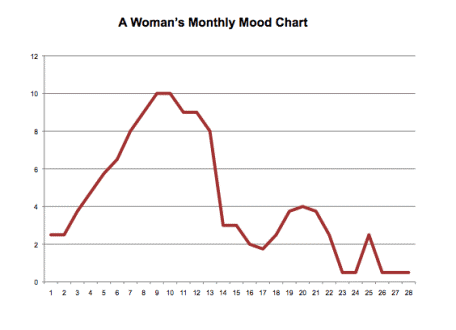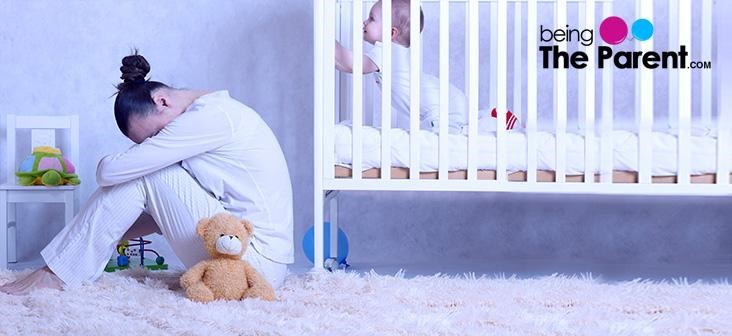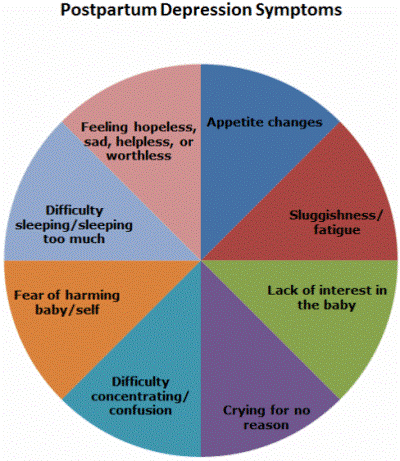Mood Swings:
Mood swings, also referred to mood fluctuations is defined as an evident change in a person’s attitude or emotional state or expression. It is a state of rapid mood changes. This could be in form of extreme depression which happens daily or at frequent intervals. Actual mood swings happen when a person becomes sad from being happy in no time and often without an explicable reason. A postpartum depression on the other hand includes symptoms as mood fluctuations, crying for no reason, emotional vulnerability, irritation, feeling sad and lonely, feeling of incompetence, but the symptoms are more serious and it is more enduring. These symptoms sometime need medical supervision.

Let us first see the causes of mood swings and ways to control it. Then we will discuss the causes of postpartum depression, and managing it, after which we can list the differences between the two.
Causes of Mood Swings
A strong mood swing is noticeable in women who undergo pre-menstrual disorder. Sometimes it’s just a passing phase. But at times these mood swings can get very intense and require medical attention. People who undergo mood swings develop detachment qualities and unfavourable fondness, and also exhibit suicidal pre-disposition quality. There could be two broad causes for mood swings:
- Psychiatric: Certain circumstances are proven to disturb a person’s life to the verge that a person develops suicidal tendencies or becomes violent or aggressive. Given below is a list of the mental or psychiatric ailments that lead to mood swings:
- Depression or unhappiness in a person’s life
- Patients who experience mood extremities or who have bipolar disorders
- Patients with Borderline Personality Disorder or who are not able to retain steady relationships
- People who are exposed to some sort of drugs are more prone to have mood swings.
- Unpredictable mood swings due to lack of attention and being in a restless syndrome also called as ADHD.
- Non-psychiatric causes: Medical, hormonal and neural reasons along with lifestyle changes may also lead to mood swings:
- Frequent mood swings are marked by dementia which results in loss of thinking capacity
- After effects of a strong dosage of a drug
- Serious head injuries that can lead to attention deficit disorder could also be a reason for mood swings
- Stress is the biggest factor which could be attributed to a mood swing
- Spot of tumor present in the brain may attribute to mood swings
- Drastic hormonal changes are manifested during puberty and menopause and can lead to mood swings
- Mood swings become prominent during pregnancy, as women undergo hormonal changes
So it is seen that there are many reasons that may cause mood swings. General mood changes are quite common in everyday life, but under some situations, the mood variations can be very acute and can even have an adverse effect on one’s well -being, health and the capability to execute day to day operations.

Ways To Control Mood Swings
Mood swings are a result of a combination of causes and thus the ways to handle them also differ. Here are some ways to get a grip over your mood swings:
- Nutritional needs – Intake of proper nutrition and avoiding high quantities of sugar, caffeine or alcohol can help with controlling your mood shifts. Getting adequate amount of nourishment goes a long way in managing regular mood swings.
- Sleeping Patterns – Sufficient sleep is the key to improved mood. If sleep deprived, you may feel sad and irritable. It can even influence your hunger pangs and lifestyle as a whole.
- Discipline and Schedule – If discipline and schedule is maintained, the body gets used to doing things at a given time and thus there is a lesser chance of erratic mood swings. It aids in regulating emotional expressions.
- Exercise – An active lifestyle helps in managing stress levels in the body. A good work out releases a hormone called Endorphins which helps in regulating stress and mood swings. A fair amount of exercise can do wonders for the state of your body and mind.
Now that we have an fair idea about mood swings and the causes, let us look at Postpartum Depression.

Postpartum depression refers to an acute condition which is more dominant than a mood swing and more enduring. It is generally triggered in mothers who have had a difficult pregnancy or delivery. However, it may even affect mothers who had relatively easy pregnancies and childbirth. It leads to ruthless mood swings, fatigue and a sense of despair. This is a serious ailment and can be treated by proper medical care. Postpartum depression usually arises around the first 2 or 3 months right after a baby is born but can happen at any time once delivery takes place.
Causes Of Postpartum Depression
Let us study the causes that lead to postpartum depression:
Physical reasons- After delivery, hormone levels change abruptly. Estrogen and progesterone which were earlier on the higher side during pregnancy suddenly drop leading to a depressed state accompanied by weepiness and irritability.
- There are other physical aspects or features such as:
- Lack of sleep
- Misuse of drugs and medicines
- Insufficient nutritional levels
- Low thyroid level
- Emotional reasons – If you or anyone in the family has been previously diagnosed with a mental ailment, there are higher chances of having postpartum depression.
- Few other factors:
- Acute health issues with the mother or the baby
- In case of a recent death in the family or separation from the spouse
- Public separation
- Financial worries and absence of any backing from family members
Ways To Control Postpartum Depression:
Some ways to manage postpartum depression are:
- Express yourself to people with whom you have an emotional connection
- Have your near and dear ones around for emotional comfort
- Don’t over exert yourself, its okay to cut a slack every once in a while
- Involve your partner in the parenting process so that you are not taxed with everything
- Take a hot shower, a nice body massage to ease the tense muscles
- Read and watch positive things to strengthen the mind, and the body will follow suit

Mood swings and postpartum depression are not the same things. The basic differences are as follows:
|
|
|
| ❖ Weeping and lamenting | ❖ Lack of sleep |
| ❖ Feeling of being lonely and isolated | ❖ No energy bursts |
| ❖ Lack of concentration | ❖ Very low urge to have sex |
| ❖ Irritation and frustration | ❖ Alterations in food intake and diet |
| ❖ Anxiety | ❖ Extreme concerns |
| ❖ Grief and sorrow | ❖ Feeling hopeless |
| ❖ Very low levels of concentration | ❖ Panic attacks and getting overly disturbed about the baby’s health. |
Now that you know quite a bit about these two conditions, you have to learn to overcome them. Life is full of difficult turns and times, and one of the toughest journeys is that of a mother. But if you wish to overcome these challenges, don’t give in to negative feelings. We all experience a depressed state of mind and feel hopeless some time or the other. But you have to remember that it shall all pass. Cast aside all negativity and prepare for a fresh new battle. That is life and it is beautiful, only if you can look past the momentary sorrows and troubles.

